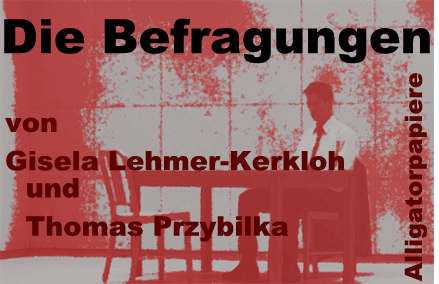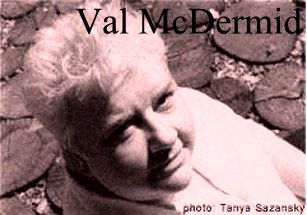Alligatorpapiere. Druckansicht Alle Befragungen
Val Mc Dermid
Question: Why crime mystery?
The longer answer is that I failed as a poet, a literary novelist and a playwright. So I made a last throw of the dice with a genre I'd always enjoyed and admired, and which I felt I understood conceptually.
Q: Do you know German crime fiction?
V. McDermid: Sadly, not as well as I know German crime writers! Very little is translated into English. We are translating a lot more these days than we were five years ago, but oddly enough, not from Germany. So I think the only contemporary German crime writer I have read in translation is Ingrid Noll.
Q: If so, what do German crime mysteries mean to you?
V. McDermid: – – –
Q: Do you think, German crime fiction can compete with international crime fiction?
V. McDermid: Hard to answer: on the evidence of what is being translated in the UK (Swedish, Danish, Norwegian, Icelandic, Spanish, French, Italian, Greek, Russian) it would seem not at present. I don't understand why this should be.
Q: Which author is overrated?
V. McDermid: Hahahahahaha. Well, I'd have to choose a dead one. My choice would be Dorothy L Sayers. I find her books pompous and snobbish and I would rather stick needles in my eyes than spend an evening in the company of Lord Peter Wimsey. Having said that, I like the character of Harriet Vane and wonder how much more interesting Sayers' writing would be if she'd chosen to allow her a greater role.
Q: Which author is underrated?
V. McDermid: That's a much harder question, because there are a lot of good writers out there who don't seem to have broken out to a wider readership. If I had to choose one, it would be Andrew Taylor. He's a versatile, intelligent writer who brings great craftsmanship and empathy to his work. And a great storyteller.
Q: Crime mystery – is it literature?
V. McDermid: At its best, it certainly can be. In the hands of the better practitioners, the prose can hold its own against literary writers. And as far as the art of narrative is concerned, it sits well in the historical tradition of the novel. In recent years, crime writers have shown themselves willing to experiment with form as well as voice, demonstrating that the crime novel is far more than a collection of conventions.
Q: How did you get into crime mysteries?
V. McDermid: When I was a child, I used to stay a lot with my grandparents, and my library books never lasted long enough. They had a copy of Agatha Christie's The Murder at the Vicarage – it was their only book apart from the Bible – and so I used to read it over and over again when I ran out of things to read. And I was hooked.
Q: What is your favourite murder weapon?
V. McDermid: An exploding bottle of Weissbier.
Q: Murder – is it necessary?
V. McDermid: I think so. There have been some notable crime novels that have dispensed with the body (Sayers' "Gaudy Night", Reginald Hill's "Pictures of Perfection", Barbara Wilson's "Gaudi Afternoon", for example), but for my money, they leave the reader feeling somehow cheated. The presence of a body somehow ups the ante, and its absence can feel deflating.
Q: Why do you write?
V. McDermid: Because I am a horrible person when I don't. I don't feel as if I have a lot of choice in the matter. I wrote before I was published; if it all ended tomorrow, I would still write.
Q: Are your crime books set in the present?
V. McDermid: Mostly, though I have written a couple of books with a split time frame; partly in the present and partly in the relatively recent past.
Q: Where would you choose the setting?
V. McDermid: Generally, anywhere that interests or excites me. Some books choose their settings as a result of the demands of the story – for example, "The Last Temptation" couldn't have been set anywhere other than continental Europe, and I can't imagine "A Place of Execution" set anywhere other than the White Peak in Derbyshire. But sometimes visiting a place will trigger off a response that makes me want to set something there, such as Toledo ("Killing the Shadows") or St Petersburg ("Hostage to Murder").
Q: What do food and drink mean to you?
V. McDermid: A source of personal pleasure and conviviality. I enjoy cooking and sharing meals with friends and family. And of course, drinking is one thing writers love to do when they are gathered together! I know some people who are familiar with my capacity for drink may be shocked by this, but I never drink when I'm alone. It is entirely a social pleasure.
Q: Sex in crime?
V. McDermid: Only when it advances the plot and/or tells us something about the characters that we can't readily learn any other way. Otherwise, it slows down the pace. And as I have said before, it's much easier to do good sex than it is to write it.
Q: If so, why?
V. McDermid: Well, often I ask myself the same question when I have read something that has killed the pace or alienated me from the characters�
Q: If not, why?
V. McDermid: Because, with a few notable exceptions, most of us cannot write sexy sex.
Q: Is there "female" crime?
V. McDermid: I hate to generalise, but ... there is no question that women have a different sensibility from men. Probably this is mostly social conditioning, but there is, I believe, a genetic as well as a cultural component to this. At its most general, men tend to tell stories in a more linear way; women tend towards more complicated psychological plotting. Chandler once famously said that when he was stuck for what to do next, he would have a man walk through the door with a gun. I can't think of a single woman crime writer who would consider that valid proposition. I think we also write about violence from a different perspective - women tend to have more empathy with the victims because we are taught to think of ourselves as being potentially in that role.
Q: For whom do you write?
V. McDermid: For myself.
Q: Plot development – your first thoughts?
V. McDermid: I'm an outliner. A story can be a couple of years or more in the making from having the first germ of an idea to being ready to write it. That time is spent in exploring the possibilities of story and character, working out the mechanics of the plot, building in complexity and confusion, getting to know the people who make the story work and figuring out why they do the things they do. I don't commit anything to paper at that point except technical information that I need to refer back to; if it's not interesting enough for me to hold it in my head, why would it be interesting for a reader? Before I start to write, I do a synopsis for my own benefit. It's usually quite detailed; I know where the cruces of the story are, I know what the ending will be and broadly how I plan to get there.
Q: Do you make any notes and where do you get your ideas from?
V. McDermid: I only make notes about factual information. For example, with "The Last Temptation", I spent ten days in Germany and Holland talking to bargees, looking at waterways, finding out lots of details about the life of commercial watermen and women. I have a notebook filled with the product of that trip, most of which never ended up in the book but gave me a bedrock of information that meant I felt comfortable with what I was writing. Ideas are everywhere. Ideas are cheap and plentiful and often tangential. It's finding the time to develop them and write them that is hard.
Q: Where do you write?
V. McDermid: At my desk in front on my computer. In my penthouse flat in Manchester, it's on the mezzanine floor, very light and high ceilinged. My desk here is glass and steel. In my house on the coast in Northumberland, it is a two hundred year old converted stable with walls two feet thick and big windows that look out on the garden. The desk here is a traditional pine writing desk. I can only write novels when I am at home. When I'm on the road, I use my laptop to write short stories and work on other projects in hotel rooms and cafes.
Q: Does the PC hinder your writing?
V. McDermid: No, it helps. It's so easy to edit text. I wrote my first crime novel in longhand with a fountain pen and it was a nightmare. But I suppose my previous career in journalism means I am accustomed to the relationship between brain and keyboard.
Q: Your favourite book as a child?
V. McDermid: "Treasure Island", by Robert Louis Stevenson
Q: Your favourite book today?
V. McDermid: "Treasure Island", by Robert Louis Stevenson
Q: Your favourite male/female crime writer?
V. McDermid: An impossible question ... Reginald Hill / Barbara Vine if I was forced to choose.
Q: Your favourite movie?
V. McDermid: "The Third Man".
Q: Your favourite drink?
V. McDermid: It depends on the time of day.
Breakfast: cappuccino
Cocktail: Sea Breeze. (vodka, grapefruit juice and cranberry juice)
Wine: Veuve Cliquot champagne
Beer: Weissbier or Timmermans Frambozen
Whisky: 23-year-old Aberlour
Working: Diet Coke
Q: Do you cook?
V. McDermid: Yes. Rather well.
Q: Do you go out to eat, if so where?
V. McDermid: Locally, to the Heatons Tandoori, a very good curry restaurant; to That Café, an excellent bistro; to The Orangery, a satisfactory café bar. In Manchester city centre, to any one of a dozen restaurants specialising in a variety of international cuisine. In Newcastle, Café 21, The Fisherman's Lodge, Live Café and Heartbreak Soup.
Q: What is your favourite item of clothing?
V. McDermid: My tartan velour scarf.
Q: Soccer – is this a topic for you?
V. McDermid: Absolutely. Even if this has been a tragic season for Manchester United.
Q: Women/men – is it important to you?
V. McDermid: Depends on what function I need them for. In most respects, it's irrelevant. But I only have sex with women.
Q: What is your favourite city in your country?
V. McDermid: There is no right answer to this question. Whatever I say will get me in trouble.
Q: Your favourite country?
V. McDermid: Other than my native Scotland, Italy. Closely followed by Russia.
Q: What do you love?
V. McDermid: All sorts of things. But mostly spending time with my son.
Q: What do you detest?
V. McDermid: Dishonesty.
Q: Best school result – in what?
V. McDermid: English
Q: Worst school result – in what and why?
V. McDermid: Art. Partly that I have no talent whatsoever in that area, but mostly because I had an art teacher who was obsessed with italic handwriting, and my handwriting is and always has been abysmal.
Q: Your dream job?
V. McDermid: The one I do.
Q: Do you have any idea why you answered this list of questions?
V. McDermid: Because my mother told me always to be polite.
Val McDermid
Val McDermid wurde 1955 in Schottland geboren. Nach ihrem Universitätsabschluß in Englisch an der Oxford University arbeitete sie als Journalistin. Seit 1991 lebt und arbeitet Val McDermid als freie Schriftstellerin. Ihre Karriere als Autorin begann sie mit zwei Theaterstücken (aufgeführt 1980 und 1981).
Val McDermid wird zu den "big shots" der englischsprachigen Kriminallitertur gezählt. In Deutschland wurde sie mit den beiden Serien um Lindsay Gordon und Kate Brannigan bekannt, die ab 1990 in der Ariadne Reihe des Argument Verlages erschienen. Für ein wesentlich größeres Publikum in Deutschland wurde sie aber erst dann ein fester Begriff, als ihre Kriminalromane im Droemer Knaur Verlag erschienen. Die deutschen Übersetzungen ihrer Krimis sind kurz nach Erscheinen stets in den oberen Rängen der Bestseller-Listen zu finden. Mit "Die Erfinder des Todes" (D 2001, "Killing the Shadows" UK 2000, USA 2001) gelang ihr ein kleines Kabinettstück: Krimiautoren werden von einem Serienmörder auf exakt die in ihren Krimis beschriebene Art und Weise vom Leben zum Tode gebracht.
Von "The Times" und "The Irish Times" wird Val McDermid als eine der 100 besten (englischsprachigen) Kriminalschriftstellern genannt [Murder They Write: One Hundred Masters Of Crime]. Seit 1995 kann Val McDermid auf eine veritable Serie von internationalen Krimipreisen zurücksehen:
1995 – Gold Dagger
1997 – Le Masque de l'année
1998 – Le Grand Prix des Romans d'Aventures
2000 – Barry Award
2001 – Los Angeles Times Book Award
2001 – Dilys Award
2001 – Anthony Award
2001 – Macavity Award
Einige ihrer Krimis wurden für das Fernsehen adaptiert. In Deutschland lief ab dem 30.11.2003 im ZDF die dreiteilige Serie "Hautnah – Die Methode Hill". Neben ihren ausgezeichneten und spannenden Krimis liegen von Val McDermid die Sachbücher "A Career In Crime" (zusammen mit Marcia Muller, Stella Duffy und Ellen Hart) und "A Suitable Job for a Woman. Inside the world of women private eyes". vor.
Val MdDermid gibt einen newsletter heraus, der kostenfrei unter [email protected]
abrufbar ist.
Homepage: www.valmcdermid.com
Interview & Bibliografie: der bücherfreund
Serienchronologie: krimi-couch.de
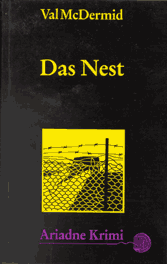 |
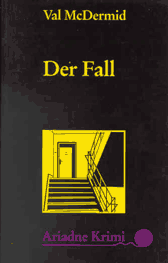 |
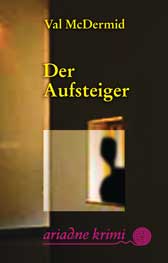 |
 |
|
 |
 |
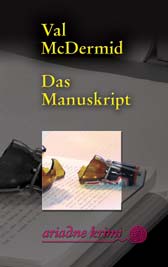 |
 |
 |
 |
 |
 |
 |
 |
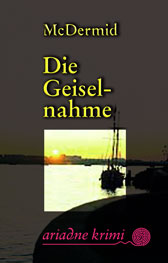 |
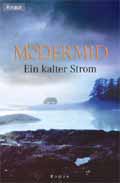 |
 |
Die Kriminalromane:
1990, Die Reportage. Ariadne 1013
1991, Das Nest. Ariadne 1021
1992, Der Fall, Ariadne 1033
1994, Der Aufsteiger. Ariadne 1059
1994, Mörderbeat in Manchester. Fischer Taschenbuch 11711
1995, Crackdown. Fischer Taschenbuch ?????
1997, Clean Break. Fischer Taschenbuch 13154
1997, Das Kuckucksei. Ariadne 1095
1998, Das Manuskript. Ariadne 1105
1999, Abgeblasen. Kate Brannigans erster Fall. Ariadne 1120
1999, Das Gesetz der Serie. Ariadne 1112
1999, Schlußblende. Knaur 60941
2000, Clean Break. Fischer Taschbuch 15007
2000, Das Lied der Sirenen. Knaur 61767
2000, Luftgärten / Kickback. Kate Brannigans zweiter Fall. Ariadne 1124
2000, Ein Ort für die Ewigkeit. Droemer Knaur
2000, Skrupellos. Kate Brannigans dritter Fall. Ariadne 1126
2001, Abgeblasen. Knaur 61876
2001, Clean Break. Fischer Taschenbuch 50443
2001, Die Erfinder des Todes. Droemer Knaur
2001, Das Gesetz der Serie. Knaur 61889
2001, Das Lied der Sirenen. Knaur 61964
2001, Ein Ort für die Ewigkeit. Knaur 61911
2003, Die Erfinder des Todes. Knaur 62247
2003, Die Geiselnahme. Ariadne 1143
2003, Ein kalter Strom. Knaur 62330
2003, Das Lied der Sirenen. Knaur 62429
2003, Ein Ort für die Ewigkeit. Knaur 62347
2003, Schlußblende. Knaur 62428
2004, Ein kalter Strom. Knaur 62740
Die Krimikurzgeschichten:
2002, Abgekupfert. Knaur 62092
Stand: 31.3.2004
Alle Titel und natürlich jedes andere lieferbare Buch können und sollten Sie bei Missing Link in Bonn bestellen, einer Buchhandlung, die sich auf Sekundärliteratur zum Krimi, auf Kriminalliteratur und auch auf die Beschaffung ausländischer Literatur spezialisiert hat.
Buchhandlung Missing Link
Zweigniederlassung Bonn
Thomas Przybilka
Buschstr. 14
53113 Bonn
Fax: 0228 - 24 21 385
Tel: 0228 - 24 21 383
e-mail: [email protected]
- deutsche Bücher stets porto- und verpackungskostenfrei!
- fremdsprachige Titel ab einem Rechnungsendbetrag von EUR 52,00 innerhalb der BRD stets porto- und verpackungskostenfrei!
